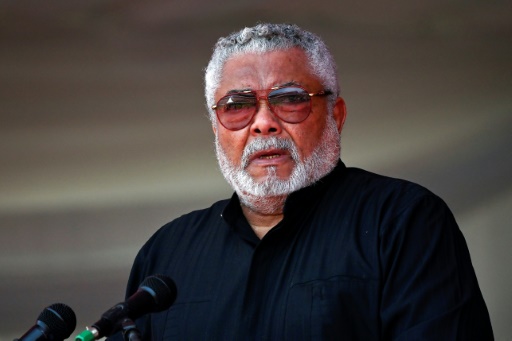
[ad_1]
As Ghana prepares for the funeral of former President Jerry Rawlings, the two main political parties vie for his legacy.
Rawlings ruled for two decades, first as a military ruler and then as president-elect.
He died in November at the age of 73 and his funeral was originally scheduled for December 23 but was postponed, due to what the Foreign Office called “unforeseen circumstances”.
It will now take place on Wednesday in the capital Accra.
Behind the scenes, Rawlings’ family, traditional rulers and political figures have disagreed over the legacy of the former Air Force flying lieutenant, who twice toppled governments but was widely regarded by the poor as their champion.
Rawlings got his first glimpse of power in 1979 when he banded together with other junior officers frustrated with rampant corruption to take control.
He quickly passed the reins to an elected president but soon returned to the top following another coup on December 31, 1981.
The son of a Scottish father and a Ghanaian mother, he became a national icon, ruling Ghana for 20 years until 2001, being elected president at the polls in 1992 and inaugurating democracy.
First a populist inspired by the leftist policies of the Soviet Union and Cuba, he eventually turned to the free market economy to stimulate Ghana’s ailing economy.
He eventually became a major figure in West Africa and also a symbol of Pan-Africanism.
‘Political trophy’
A few days before the funeral ceremony, to be held in Independence Square, a symbol of Ghana’s victory over colonial Britain, the square and the adjacent avenue were already swarming with soldiers.
“They are afraid there are problems,” said Esther Amoo, a local business owner, as she watched the troops train for the ceremony.
“Everyone wants to get their hands on our former president. Since JJ’s death, it’s a mess everywhere!” she added.
After Rawlings’ death on November 12, the organization of the funeral became a coveted political trophy, even as the country was in the midst of presidential elections.
His status as former head of state entitles him to a state funeral, but the National Democratic Congress (NDC), a party he founded and which has now joined the opposition, demanded that he be involved in its organization.
One party leader even threatened to “steal his remains” after the funeral so that the party could bury him again.
This despite the fact that Rawlings made a very public split from the NDC in 2009, calling party elders “evil old dwarves”.
Rawlings even helped current president Nana Akufo-Addo win the post for the first time in 2006.
‘A big joke’
“This whole affair of political affiliation is a big joke,” said Emmanuel Gyimah-Boadi, co-founder of the Afrobarometer think tank.
“Jerry Rawlings was deeply democratically skeptical and never missed an opportunity to express his aversion to multi-party democracy,” he added.
“For him, it was an invention of the West which did not suit Africa. It is therefore absurd that our current parties are claiming it today!”
Ghana is today often seen as a beacon of stability in a troubled region.
He held an election on December 7 that saw incumbent President Akufo-Addo win a second term, beating longtime rival John Mahama.
Rawlings’ case includes 300 documented extrajudicial killings. Until his death, he refused to offer an apology or reparations to the families of his victims.
“His line of defense was to say that some people deserved it, or even that ‘you can’t make an omelet without breaking some eggs,’” said Gyimah-Boadi.
“For me, this is the darkest aspect of his legacy: the legacy of impunity.”
Source link